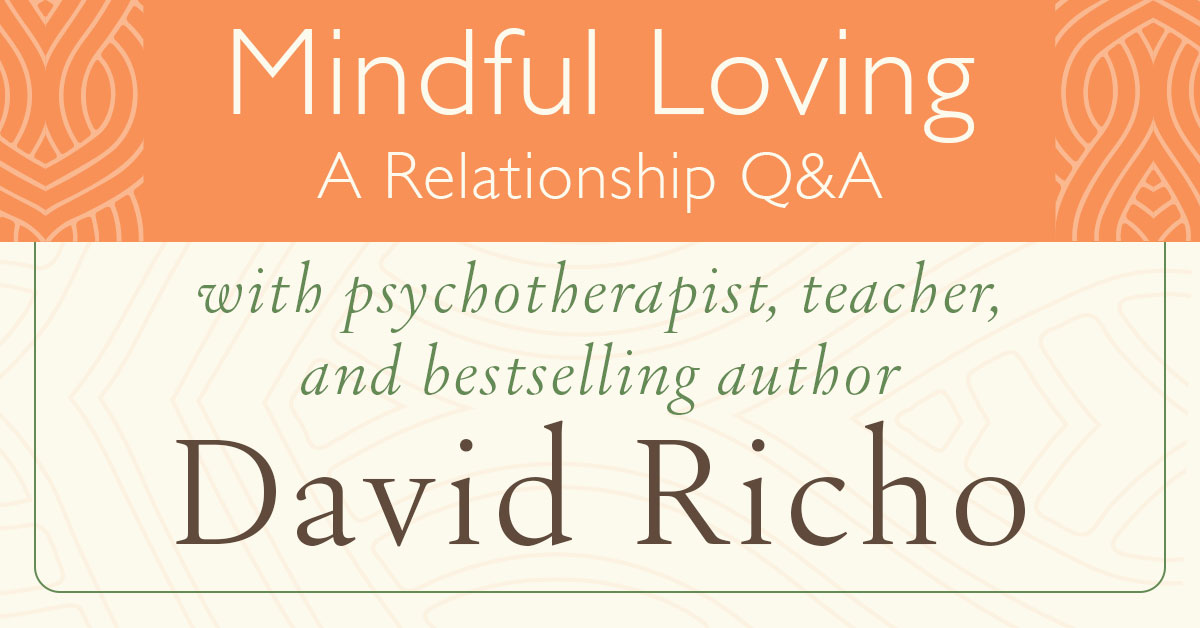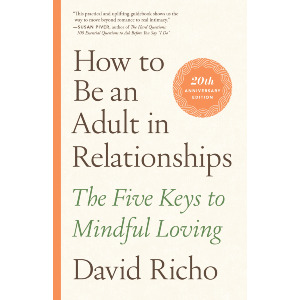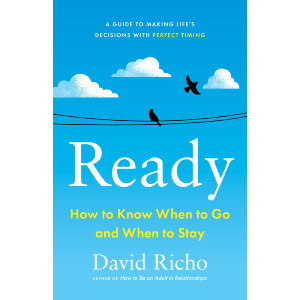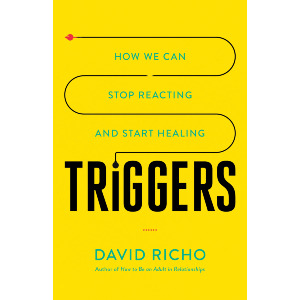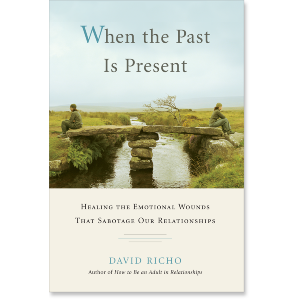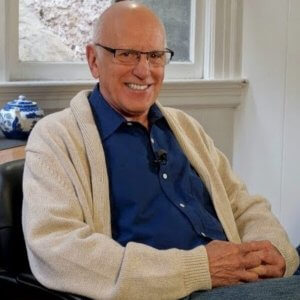A Q&A with David Richo, author of How to Be an Adult in Relationships
What does it mean to be an “adult” in relationships?
Firstly, what does it mean to be an “adult?” To be an adult is to learn to play for ourselves the roles the functional family was supposed to play for us. Becoming more adult means having an inner nurturant parent who supervises our unruly inner child, protects our endangered inner child, and comforts our scared inner child. It is only through the nourishment of our inner child that we can learn to engage in a healthy adult relationship.
To be an adult in relationships we must commit to a thoroughly truthful enterprise of ongoing love. It entails an unremitting willingness to keep agreements and handle obstacles by addressing, processing, and resolving conflicts. Happiness and mutual respect result. True love cannot be fooled, nor does it attempt to fool others. As mature adults, we can no longer be charmed by looks or sweet talk. All that matters is enduring mutual commitment.
Ultimately, to be an adult in relationships means:
- to make and keep commitments
- to act from integrity not only in our intimate relationships but in all our dealings
- to take responsibility for our feelings, behaviors, and choices
- to act in trustworthy ways, including being faithful to the ground-rules of our relationship
- to show the five A’s of love: attention, affection, appreciation, acceptance, allowing
When we apply mindfulness to our relationships, we can finally see ourselves and others as we are, in all our touching vulnerability and with all our rich potential for love.
In How to Be an Adult in Relationships you say, “love is not so much a feeling as a way of being present.” Can you elaborate on this?
Love is not so much a feeling as a way of being present. We show love through a sustained and active presence with an unconditional expression of the five A’s and without the conditioned overlays or mindsets of ego, such as judgment, fear, control, and so on. We receive love the same way—with the five A’s and without our ego interferences. In other words, love happens best in the context of mindfulness.
Mindfulness is an ancient meditation mode in which we let go of our fears, our attachments, our cravings, our expectations and entitlements, and our judgments of others. Instead of these habitual strategies, we learn to simply stay present openly in the moment—with nothing in the way—so we can experience life as it occurs. When we apply mindfulness to our relationships, we can finally see ourselves and others as we are, in all our touching vulnerability and with all our rich potential for love.
Have you seen relationships change over the last few years due to COVID? Do you have any advice during these times?
Yes, I have seen more strain on relationships because the hunkering down means we are required to spend more time together. Healthy relationships thrive on a combination of alone time and together time. When we are forced to be together for too long we begin to lose our patience with one another and anger arises. This means that we lose some of our communication skills. We may even begin to feel smothered or a loss of freedom.
If you feel the pressures of the current pandemic weighing on your relationship, I suggest sharing your concerns with your partner and working together to find a new balance of alone time and together time that works for you. Cooperation—partnership—is the heart of conflict resolution. We are not working individually for the ascendancy of our own positions. We work together for the health and happiness of the relationship.
Take a moment to assess the balance of alone time and together time within your relationship with this exercise:
VOWING/DISAVOWING | Ask yourself: Does my vow of commitment to my partner require a disavowing of any part of myself? Ask these questions of one another: Can we find ways to work separately on the inner discoveries we both need to make before we can fulfill one another’s needs adequately? Can you grant me that space? Can I allow you that space? Can I trust that you will still be there for me when I come back intact and ready to be in touch? Will I be there for you also? Or will our own urgent childhood needs or our desire for drama be so intense that we will vitiate or scuttle this whole soulful venture? Are we genuinely committed to doing the work it will take to safeguard our relationship?
How can we take critical feedback from our partners without getting defensive?
When you are committed to the work of making yourself a more loving person, you no longer rely on your own brain for all your information. You are happy to learn about yourself from your partner or anyone else you trust. You are open to finding out how you appear to those who see your shadow or dark side. You welcome feedback about how you come across to others. If you find that your ego cannot tolerate being called to task or shown to be inadequate or wrong, then the work is letting go of ego. A good affirmation is: I commit myself to find some truth in any feedback I receive.
Why do we seek to re-enact the deficits, wounds, and deprivations of our childhood with our current partners?
A poignant thing about us humans is that we seem hard-wired to replay the past, especially when our past includes emotional pain or disappointment. Though most of us want to move on from the past, we tend to go through our lives simply casting new people in the roles of key characters, such as our parents or any significant person with whom we still have unfinished emotional business. Unbeknownst to us, we are glimpsing important figures from our past in our partners, friends, associates, enemies, and even strangers. We bring them the still unfinished or unseen or unexpressed feelings and needs of childhood. Recreating relationship patterns from our childhood is our way to tell the untold story inside us and complete it.
For better or for worse, our psychic development is the result of a lifelong continuum of relationships. The adult goal is to work through each of them.
When we did not receive fulfillment in one or more of the five A’s, a bottomless pit was created in us, an unfulfillable yearning for the missing pieces of our puzzling and arid past. Mourning an unfulfilled childhood is painful. We fear grief because we know we will not be able to control its intensity, its duration, or its range, and so we look for ways around it. But engaging with our grief is a form of self-nurturance and liberation from neediness. Paradoxically, to let ourselves experience our wounded feelings fully places us on the path to healthy intimacy.
Ask yourself:
Is this my problem? Have I been afraid to grieve what I did not get from Mom and Dad and so have demanded it from partners, strangers, and innocent bystanders? Am I unable to find it in myself because I have been investing all my energy in looking for it in someone else?
This topic became another book of mine. The title says it all: When the Past Is Present: Healing the Emotional Wounds That Sabotage Our Relationships.
Our work is not to renounce our childhood needs but to take them into account, work on them, and enlist our partner to help us do this, if she or he is willing.
Why is it important to be a ‘mirror’ for your partner?
Mirroring helps us survive emotionally—that is, to experience the events of our life with the power to handle them and without being devastated or embittered by them. We all have what it takes to feel, but to experience our feelings fully and safely, they have to be “validated” by someone who mirrors them. Mirroring happens when someone accurately reflects our feelings back to us with a warm welcome. We then know we are understood and it is safe to have and show our feelings. Mirroring by someone includes unconditional positive regard for our unique needs, values, and wishes shown by someone who mindfully provides the five A’s. The element of mindfulness means that we feel loved without the ego’s artifacts of fear, attachment, control, expectation, clinging, biases, defenses, or judgment.
This practice from my book is designed to strengthen your understanding of mirroring:
MIRRORING | In every phase of life we see the influence of our earliest longings. Our work is not to renounce our childhood needs but to take them into account, work on them, and enlist our partner to help us do this, if she or he is willing. Our goal is not just to cut our parental ties but to unite with a partner who can join us in our work. As Shakespeare says in King Lear, “Who alone suffers, suffers most.”
Ask these questions of your partner: I was derailed in some of my development. Can you help me in my efforts to get back on track? Are you the person with whom I can safely welcome and revive my earliest unmet needs and redirect my thwarted strivings? Can I work with you on mutual mirroring, that is, understanding and welcoming of feelings? Do I sometimes trigger you into feeling something I couldn’t bear to feel, so that you can help me identify it and then hold it with me? Do you make me feel the things you couldn’t bear to feel? How can we challenge ourselves on all this and move past it? Which of my feelings do you mirror? Which of yours do I mirror? Which feelings do we fear in one another?
How do we know when it’s time to move on from a relationship?
Last year was my fiftieth anniversary as a psychotherapist, and I asked myself what problem I saw the most in clients. The answer was: staying too long in what doesn’t work. That has been true of me too. You?
We have all stayed too long in what doesn’t work. The “what doesn’t work” can apply to relationships, jobs, addictions, chronic pain, unresolved conflicts, enmeshment in family drama, affiliation to a religion, organization, or institution—just about anything we become involved in.
On the other hand, there are times in life when we don’t stay long enough. We don’t hang in there through thick and thin in a relationship or affiliation that really can work. There is also the mystery of timing, feeling and responding to the opportune time. Ultimately, our readiness depends on the ping of a timer not in our hands. Time is a player in all our comings and goings.
My book, Ready: How to Know When to Go and When to Stay, coming out this April, treats this topic and presents practices that can help us know our timing and act in accord with it.
Share
Related Books
How to Be an Adult in Relationships
$18.95 - Paperback
$17.95 - Paperback
$17.95 - Paperback
$19.95 - Paperback
David Richo, PhD, is a psychotherapist, teacher, writer, and workshop leader whose work emphasizes the benefits of mindfulness and loving-kindness in personal growth and emotional well-being. He combines Jungian, poetic, and mythic perspectives in his work with the intention of integrating the psychological and the spiritual.
David Richo is the author of numerous books, including How to Be an Adult in Relationships and The Five Things We Cannot Change. He lives in Santa Barbara and San Francisco, California.

